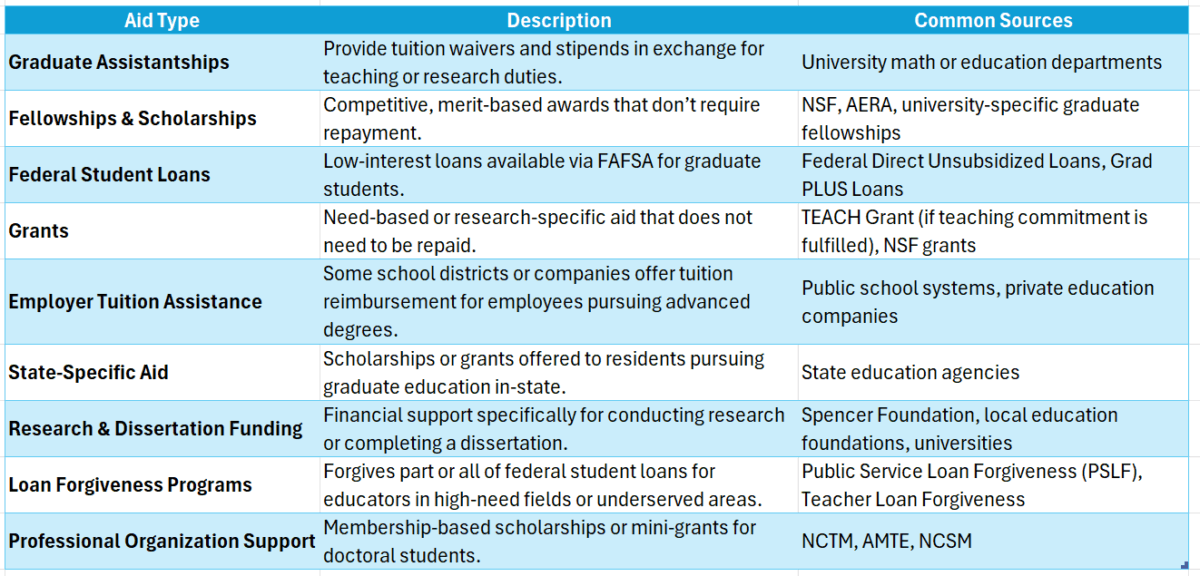
When considering a doctorate in math education, it’s essential to know where to pursue this advanced degree. The right institution can shape your career, enhance your teaching skills, and open doors to exciting opportunities. So, let’s explore some top institutions that offer a doctorate in math education!
Top Institutions for a Doctorate in Math Education
- University of Georgia: Known for its innovative programs, this university offers a comprehensive curriculum that focuses on both theory and practice.
- University of California, Berkeley: This prestigious institution emphasizes research and provides excellent resources for doctoral students.
- Florida State University: With a strong emphasis on special education, FSU offers unique insights into teaching math to diverse learners.
Scholarships for Doctoral Students in Education
Many universities provide scholarships for doctoral students in education. Here are a few options to consider:
- University Grants: Many institutions offer financial aid based on merit or need.
- Federal Scholarships: Look for government-funded programs that support education majors.
- Private Foundations: Organizations often provide scholarships specifically for those pursuing a doctorate in special education or math education.
Finding the right program and financial support can make your journey smoother and more rewarding!
Study smarter, not harder—Enroll online today!
What to Look for in a Doctorate Program in Math Education?
Choosing the right program for a doctorate in math education is crucial for shaping your future as an educator and researcher. With numerous options available, understanding what to look for can simplify your decision-making process. Here are some key factors to consider!
Accreditation Matters
Ensure the program is accredited, as this indicates it meets high educational standards. An accredited doctorate in math education will be recognized by employers, enhancing the value of your degree.
Faculty Expertise
Look for experienced faculty with research interests that align with yours. Knowledgeable mentors can significantly enhance your learning experience and open doors for future opportunities.
Financial Support
Consider financial aspects, such as scholarships for doctoral students in education. Many programs offer funding options to ease financial burdens, allowing you to focus on your studies.
Program Flexibility
Program flexibility is also important. Some doctorate in math education programs offer online or hybrid options, helping you balance work, family, and studies more effectively.
Research Opportunities
Seek programs that provide strong research opportunities, as engaging in research can deepen your understanding and enhance your resume.
Community and Networking
Finally, consider the program’s community. A supportive network can enrich your experience and lead to valuable collaborations and job offers.
The Benefits of Earning a Doctorate in Math Education
Earning a doctorate in math education can open doors to exciting opportunities. It’s not just about advanced math skills; it’s about shaping the future of education. If you’re passionate about teaching and want to make a difference, this degree is a great choice!
A doctorate in math education offers several advantages. First, it enhances your teaching skills, allowing you to inspire students effectively. Second, it prepares you for leadership roles in educational settings. You could even influence curriculum development!
Key Benefits
- Career Advancement: With a doctorate in math education, you can pursue higher positions, such as university professor or educational consultant.
- Research Opportunities: You’ll have the chance to conduct research that can impact teaching methods.
- Scholarships for Doctoral Students in Education: Many institutions offer scholarships for doctoral students in education, making it easier to finance your studies.
This support can help you focus on your passion without financial stress.
How Online Programs are Changing the Landscape of Math Education Doctorates
Getting a doctorate in math education is a big step for anyone passionate about teaching and learning. But where can you find the best programs? Online options are changing the game, making it easier for aspiring educators to earn their degrees without uprooting their lives.
Online programs offer flexibility that traditional schools can’t match. You can study from home, which is perfect for busy teachers or those with families. Plus, many online doctorate in math education programs are designed to fit your schedule, allowing you to balance work and study.
Benefits of Online Doctorate Programs
- Accessibility: You can attend classes from anywhere, making it easier to find a program that fits your needs.
- Diverse Options: Many universities now offer specialized tracks, including a doctorate in special education, which can enhance your teaching skills.
- Financial Support: Don’t forget to look for scholarships for doctoral students in education. Many online programs offer financial aid to help you succeed.
Financial Aid Options for Doctorate in Math Education Students

When considering where to get a doctorate in math education, understanding financial aid options is essential. Pursuing this degree can be costly, but numerous resources can help manage expenses. Knowing your financial options can greatly impact your educational journey.
Types of Financial Aid
- Scholarships for Doctoral Students in Education: Many universities offer scholarships specifically for doctoral students, significantly reducing tuition costs.
- Grants: Unlike loans, grants do not require repayment. Seek grants aimed at those pursuing a doctorate in math or special education.
Additional Funding Sources
- Assistantships: Teaching or research assistantships often provide stipends and tuition waivers, allowing you to gain valuable experience while studying.
- Federal Student Loans: If scholarships and grants fall short, federal loans can help cover remaining costs. Explore all options before taking on debt.
Finding Scholarships
- University Resources: Your university’s financial aid office can provide lists of available scholarships.
- Professional Organizations: Many math education organizations offer scholarships, which can also enhance networking opportunities.
Budgeting Tips
- Create a Budget: Track your expenses, including tuition and living costs, to manage finances effectively.
- Cut Costs: Save money by buying used textbooks or sharing housing with other students. Every little bit helps!
Study smarter, not harder—Enroll online today!
Real-World Applications of a Doctorate in Math Education
Getting a doctorate in math education is an exciting journey that opens many doors. It’s not just about teaching math; it’s about shaping how future generations understand and use math in their lives. This degree can lead to various careers, from teaching at universities to developing educational programs that make math more accessible for everyone.
A doctorate in math education can lead to impactful roles. Here are some real-world applications:
- University Professor: Teach and inspire future educators.
- Curriculum Developer: Create engaging math programs for schools.
- Educational Researcher: Study how students learn math and improve teaching methods.
Additionally, if you’re interested in supporting students with special needs, consider a doctorate in special education. This can enhance your ability to teach diverse learners effectively.
Funding Your Education
Pursuing a doctorate can be expensive, but there are scholarships for doctoral students in education. These scholarships can help ease the financial burden, allowing you to focus on your studies and research. Look for grants and funding opportunities at universities or educational organizations to support your journey.
Success Stories: Graduates of Doctorate Programs in Math Education
Getting a doctorate in math education opens doors to exciting career opportunities, shaping the future of education. Graduates often have inspiring stories that showcase the impact of their advanced studies. For example, Dr. Sarah focused on curriculum development and created innovative math programs that engage students, earning national recognition for her contributions. Funding a doctorate can be challenging, but scholarships for doctoral students in education can ease financial burdens.
Many graduates, like Dr. James, benefited from these opportunities, allowing them to pursue their passion without overwhelming debt. Graduates often find diverse roles, becoming university professors or educational consultants, influencing math education at various levels. Dr. Emily developed a math literacy program that significantly improved student performance in underprivileged schools, illustrating the real-world impact of advanced education. Additionally, pursuing a doctorate in special education can complement a math education focus, encouraging collaboration and networking. This networking can lead to job opportunities and partnerships that enhance graduates’ careers.
How Scholarship.Education Can Help You Find Your Ideal Doctorate Program
Finding the right place to earn your doctorate in math education is crucial for your career. It can open doors to advanced teaching positions, research opportunities, and even leadership roles in educational settings. But where do you start? That’s where Scholarship.Education comes in to guide you through the process.
Comprehensive Program Listings
Scholarship.Education offers a curated list of universities that provide a doctorate in math education. You can easily compare programs based on location, curriculum, and faculty expertise. This makes it easier to find a program that fits your needs and goals.
Scholarships and Financial Aid
Don’t let finances hold you back! Scholarship.Education also highlights scholarships for doctoral students in education. These financial aids can significantly reduce your tuition costs, making it more feasible to pursue your doctorate in special education or math education.
Expert Advice and Resources
Additionally, Scholarship.Education provides expert articles and resources to help you navigate the application process. From tips on writing a standout personal statement to preparing for interviews, you’ll find everything you need to succeed
Study smarter, not harder—Enroll online today!
FAQs
1. What is a Doctorate in Math Education?
It’s a terminal degree focused on advanced research, teaching methods, curriculum development, and leadership in mathematics education.
2. What types of doctorate degrees are available in math education?
Common options include the Ph.D. in Mathematics Education (research-focused) and the Ed.D. in Math Education (practice and leadership-focused).
3. Who should consider this degree?
This degree is ideal for experienced educators, curriculum specialists, or anyone aiming for roles in academia, educational leadership, or research.
4. What are the admission requirements?
Typically, you’ll need a master’s degree in education or a related field, teaching experience, recommendation letters, a statement of purpose, and sometimes GRE scores.
5. How long does it take to complete a doctorate in math education?
Most programs take 3 to 5 years to complete, depending on the program structure and whether you attend full-time or part-time.
6. What can I do with a doctorate in math education?
Graduates often work as university professors, math curriculum developers, district-level education leaders, or researchers in educational policy and instruction.





